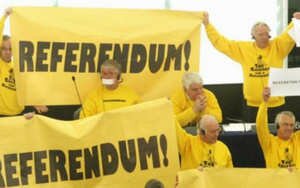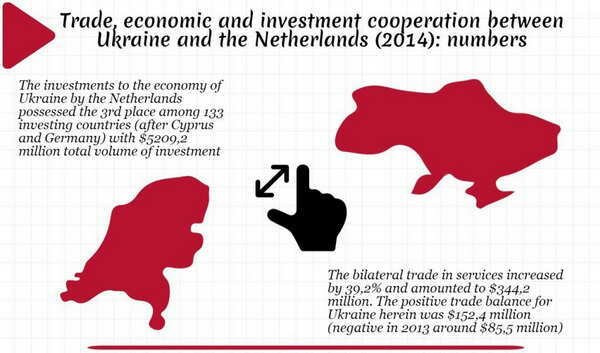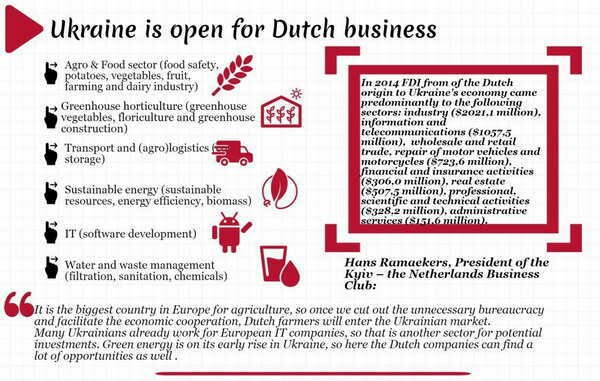
Author — A. Cherkas, an Analyst of the Free Voice IAC, student of Rijksuniversiteit Groningen
It's no secret that in a few weeks in the Netherlands there will be held a consultative referendum on association between Ukraine and the EU. Apart from concerns about the “failure” of the Dutch decision on Ukraine and fakes of the opponents of the Association, there is little information about why the Dutch (taking into consideration their mentality and the low level of awareness about the events in Ukraine) should vote “for” the future Association between Ukraine and the EU. Let's try to isolate and characterize the key arguments “for”.
1. The Association Agreement between Ukraine and the EU is first of all trade and economic cooperation, as 95 % of the text of the Agreement is on such cooperation. We are talking about a deep and comprehensive free trade area between Ukraine and the EU, as well as about concrete measures for the implementation of the EU legislation (300 documents) to reform the economy. That is, it means economic integration, standardization of the Ukrainian economy by European standards. Thus, it will be easier for Dutch entrepreneurs to develop their business in Ukraine, and for the Ukrainian side — to export goods to the Netherlands. The Dutch Trade Promotion Council (Nederlands Centrum voor Handelbevordering) calls Ukraine “a large consumer market”, “a country with a high agricultural potential that is not yet fully developed” and “a country for different kinds of Dutch investments”.

2. A similar associations with the EU have recently been signed by countries such as Georgia, Moldova, Israel, Morocco, Tunisia, Turkey, the countries of Central and South America. Actually all these partnership agreements have shown their effectiveness, as both the parties benefitted from them. In particular, in its report in 2015 on Turkey, the European Commission points out that today “the Turkish economy is well balanced and can claim to be a true market one”. The Netherlands' share of foreign direct investments (FDI) in Turkey is 23 %. Import and export of goods into/from Turkey in 2014 amounted to 3.5 billion US dollars, respectively. Obviously, such a success of mutual trade and economic relations with Turkey would not have been possible without signing the Association Agreement with the country.
3. About 500 companies with Dutch capital are successfully working and developing business in Ukraine today. In particular, Royal Dutch Shell, ING-Ukraine, Rabobank, Philips, Akzo Nobel, Damen Shipyards, Unilever Export. In December, analysts of one of the largest banks in the Netherlands ABN AMRO gave Ukraine the first place in the ranking of promising markets for the Dutch businesses' investments, because Ukraine does have an attractive investment climate. It was also pointed out that Ukraine's foreign trade is increasingly oriented towards Western markets, and the agricultural sector can be attractive to Dutch investors. The ABN AMRO's financial experts point out that Ukraine is one of the most important agro-industrial regions of the world. Mutually beneficial cooperation between Ukraine and the Netherlands in the business environment is due to both, the successful conduct of the Dutch business in Ukraine, and of the Ukrainian business- in the Netherlands.

4. The Netherlands is one of the most striking examples of the liberal democracies of the West. Freedom, in a very broad sense of the word — is one of the most important values of the Dutch. For the Netherlanders has always been very important the so-called “direct democracy.” In fact, the referendum on the Association between Ukraine and the EU is just a clear manifestation of this. That is why it is important to mention the commonness in the freedom of the will expression between the Ukrainians and the Dutch, because it was the desire to change the country, making it closer to EU standards and “Western democracy” through the signing of the Association Agreement that caused Euromaydan (Revolution of Dignity) in 2014. The Dutch “ja” on 6 April 2016 will mean showing the Netherlands' people's respect to the Ukrainian people's conscious choice to introduce European standards.
5. The Association between Ukraine and the EU aims to strengthen the forces of law, a tolerant attitude towards minorities, in particular, LGBT, included. In January, the representatives of the Ukrainian LGBT community in an open letter of appeal called on the Netherlands’ LGBT organizations to support April 6 the Association with their votes, because in the last two years of Ukraine's European integration, they have already demonstrated a “significant progress of our state to comply with LGBT rights”. Last autumn was banned discrimination based on sexual orientation and gender identity in employment, and the Government adopted a plan of action to comply with the national human rights, where a whole chapter is dedicated to the obligations related to LGBT issues. In early March 2016, the Cabinet of Ministers of Ukraine declared the project preparation for the legalization of same-sex marriages.
6. The Association Agreement “will not cost the Dutch extra charge” because the majority of the commitments are taken on by the Ukrainian side. Thus, the Agreement provides for Ukraine's right to receive financial assistance from the EU, but only in case of realization of all its “promises” about the reforms set out in the paper. The Agreement itself does not regulate the process of getting financial assistance.
7. Since the Dutch are very honest and straightforward, they and the Ukrainians have to realize one simple but important thing: responsibility for the implementation by the country of all the above-mentioned and not mentioned in the text of the Agreement necessary reforms rests with Ukraine alone.
8. The Association Agreement can be called a sort of a step in building a zone of stability around Europe. The Netherlands, as well as the EU are interested in improving the overall security of the EU. Today, in the situation of various forms of Russia's aggression, successful and democratic Ukraine could be the key to Europe's strength, not only inside it, but also in the near abroad.
9. If you now try to sum up the implementation by Ukraine of points of the Agreement, it is possible to state that Ukraine has not failed completely to implement reforms. As pointed out by Andreas Umland, after the publication in 2014 of the “Strategy for Reforms”, Ukraine has adopted a lot of potentially important laws: on the government's lustration, eradication of corruption, procurement, financing of parties, reforming of bureaucracy, modernization of higher education, creation of new police, re-organization of the public radio etc. Among the positive changes in the direction of reforms in 2015, we can mention the following: reduction in the number of civil servants (sometimes up to 70 %); deregulation, decision to join the PISA and “Horizon 2020”; launch of open data resources by the Ministry of Finance and e-petitions to the President.
“Yes” on April 6, 2016 will not only mean support for Ukraine, but also that for the EU's policy (which, by consensus, has adopted a decision on the conclusion of the Agreement). The basic message of the Agreement is to “bring more Europe into Ukraine, not Ukraine into Europe”.
In the Dutch context, this should be understood not as an immediate future Ukraine's membership in the EU, thousands of labor (and not only) migrants seeking happiness in the Netherlands, but as introduction of European standards. Thanks to the Association with the EU, Ukraine will get a better chance to become a state, which people do not leave, but into which people arrive in.

